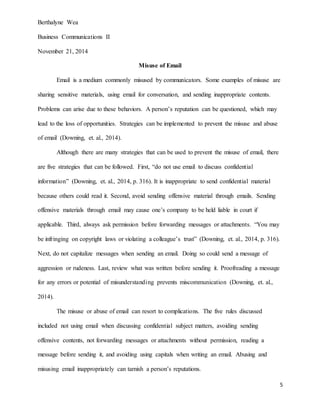Recommended
More Related Content
What's hot
What's hot (19)
Electronic Eavesdropping in the Workplace: Can We? Should We? What Could Poss...

Electronic Eavesdropping in the Workplace: Can We? Should We? What Could Poss...
Similar to Essay 4
Similar to Essay 4 (15)
Post 1CyberstalkingCyberstalking is defined as the online st.docx

Post 1CyberstalkingCyberstalking is defined as the online st.docx
Discussion Board SamplesThe following are tips and sample discus.docx

Discussion Board SamplesThe following are tips and sample discus.docx
Discussion Board SamplesThe following are tips and sample discus.docx

Discussion Board SamplesThe following are tips and sample discus.docx
LexisNexis Survey of Law Firm File Sharing in 2014

LexisNexis Survey of Law Firm File Sharing in 2014
Processing obtained email data by using naïve bayes learning algorithm

Processing obtained email data by using naïve bayes learning algorithm
Essay 4
- 1. 5 Berthalyne Wea Business Communications II November 21, 2014 Misuse of Email Email is a medium commonly misused by communicators. Some examples of misuse are sharing sensitive materials, using email for conversation, and sending inappropriate contents. Problems can arise due to these behaviors. A person’s reputation can be questioned, which may lead to the loss of opportunities. Strategies can be implemented to prevent the misuse and abuse of email (Downing, et. al., 2014). Although there are many strategies that can be used to prevent the misuse of email, there are five strategies that can be followed. First, “do not use email to discuss confidential information” (Downing, et. al., 2014, p. 316). It is inappropriate to send confidential material because others could read it. Second, avoid sending offensive material through emails. Sending offensive materials through email may cause one’s company to be held liable in court if applicable. Third, always ask permission before forwarding messages or attachments. “You may be infringing on copyright laws or violating a colleague’s trust” (Downing, et. al., 2014, p. 316). Next, do not capitalize messages when sending an email. Doing so could send a message of aggression or rudeness. Last, review what was written before sending it. Proofreading a message for any errors or potential of misunderstanding prevents miscommunication (Downing, et. al., 2014). The misuse or abuse of email can resort to complications. The five rules discussed included not using email when discussing confidential subject matters, avoiding sending offensive contents, not forwarding messages or attachments without permission, reading a message before sending it, and avoiding using capitals when writing an email. Abusing and misusing email inappropriately can tarnish a person’s reputations.
